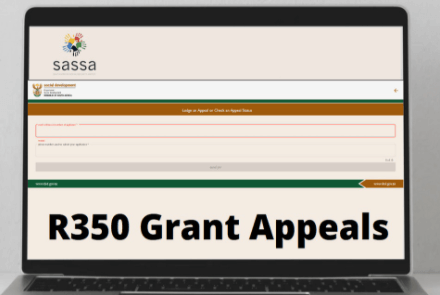Sassa Status Check For R350 Payment Dates

In the realm of social support programs in South Africa, the R350 Social Relief of Distress Grant has emerged as a crucial lifeline for many individuals facing financial hardships. This grant, provided by the South African Social Security Agency (SASSA), aims to alleviate poverty and provide temporary economic assistance to those who are unemployed or experiencing extreme distress.
However, staying informed about payment dates and checking one’s SASSA status can be quite challenging. Imagine being stranded on a deserted island, desperately awaiting a rescue ship that will bring you freedom from isolation and uncertainty. In a similar vein, understanding how to navigate the SASSA payment system is like deciphering a map that leads to much-needed relief.
With this in mind, our article focuses on providing an objective and analytical guide to checking your SASSA status for R350 payment dates. By following a step-by-step process outlined in this article, individuals can gain insights into their eligibility, application status, and upcoming payment dates. Exploring the importance of staying informed about these dates also reveals how it empowers individuals with knowledge and allows them to plan their finances accordingly.
Furthermore, we delve into real-life stories of individuals who have benefitted from the R350 Grant, shedding light on its impact on alleviating poverty and enhancing livelihoods across South Africa. Additionally, we discuss some challenges and criticisms associated with this grant program while advocating for increased social support programs that address the diverse needs of vulnerable populations in society.
Overview of the R350 Social Relief of Distress Grant
The R350 Social Relief of Distress Grant provides financial assistance to eligible South African citizens in need of immediate relief. This grant is designed to address the pressing needs of individuals and households who are experiencing extreme poverty or are otherwise unable to meet their basic needs.
The importance of social relief cannot be overstated, as it serves as a safety net for those who are most vulnerable in society.
To be eligible for the R350 grant, applicants must meet certain requirements. Firstly, they must be South African citizens or permanent residents with valid identification documents. Secondly, they should not be receiving any other form of income support from the government or any other source. Additionally, applicants should have no access to any form of employment income or unemployment insurance benefits. Lastly, individuals applying for this grant should not be beneficiaries of any other social grants provided by the government.
By providing financial assistance through the R350 Social Relief of Distress Grant, the South African government aims to alleviate poverty and provide immediate relief to those in desperate need. This grant plays a crucial role in ensuring that individuals and households can meet their basic needs such as food, shelter, and healthcare.
However, it is important to note that this grant is intended as temporary relief and does not provide a long-term solution to poverty. Nonetheless, it serves as a lifeline for many individuals who are struggling financially and underscores the government’s commitment towards addressing poverty alleviation in South Africa.
Importance of the R350 Grant for South Africans
Vital to the livelihoods of countless South Africans, the R350 Grant holds immense significance as a lifeline for those in need. Its importance cannot be overstated, as it provides much-needed financial support to individuals and families who are struggling to make ends meet. The impact of the R350 Grant is undeniable, and it plays a crucial role in alleviating poverty and reducing inequality in South Africa.
- Financial Stability:
The R350 Grant offers a sense of stability to individuals who are living below the poverty line. It provides them with a regular source of income that can be used for essential expenses such as food, rent, and healthcare. This financial support not only helps meet immediate needs but also enables recipients to plan for their future and take steps towards economic independence. - Social Well-being:
Apart from its direct monetary benefits, the R350 Grant also has a positive impact on the social well-being of individuals. By providing financial relief, it reduces stress and anxiety related to meeting basic needs. This allows recipients to focus on other aspects of their lives, such as education or skills development, which can ultimately lead to improved social mobility. - Economic Stimulus:
The R350 Grant has wider implications beyond individual recipients. By injecting money into local economies, it stimulates economic activity at various levels. Increased spending on goods and services creates opportunities for businesses and supports job creation within communities. This ripple effect contributes to overall economic growth and development.
The importance of the R350 Grant cannot be underestimated in its role as a lifeline for many South Africans facing financial hardship. Its impact extends beyond immediate financial relief by promoting stability, improving social well-being, and driving economic growth at both individual and community levels.
As an essential tool in addressing poverty and inequality, this grant plays a vital role in empowering individuals towards greater freedom and opportunity. It provides resources and support to individuals and communities, allowing them to access education, healthcare, and basic necessities, breaking the cycle of poverty and creating a pathway for upward mobility. By investing in people’s potential and enabling them to build sustainable livelihoods, this grant contributes to the overall development and prosperity of society as a whole.
Understanding the SASSA Payment System
Understanding the intricacies of the SASSA payment system is crucial for individuals and families who rely on it as a source of financial support. The South African Social Security Agency (SASSA) is responsible for distributing social grants, including the R350 grant, to eligible recipients. However, there have been issues with payment delays, causing frustration and anxiety among beneficiaries.
To paint a clearer picture of the SASSA payment system, let’s examine its eligibility requirements for the R350 grant. Applicants must be unemployed South African citizens or permanent residents above the age of 18. They should not be receiving any other form of income or social grant from SASSA or any other government entity. Additionally, applicants should not qualify for unemployment insurance benefits or have access to any other COVID-19 relief funds. These eligibility criteria aim to target individuals who are most in need of financial assistance during these challenging times.
Table: Eligibility Requirements for the R350 Grant
| Requirement | Description |
|---|---|
| Citizenship/Residency | Must be a South African citizen or permanent resident |
| Age | Above 18 years old |
| Employment Status | Unemployed |
| Other Income/Social Grants | No other form of income or social grant |
| Unemployment Insurance Benefits | Should not qualify for unemployment insurance benefits |
| Access to Other COVID-19 Relief | Should not have access to any other COVID-19 relief funds |
By understanding these requirements and how they contribute to determining eligibility for the R350 grant, individuals can better navigate the SASSA payment system and ensure timely receipt of their much-needed financial support. However, it is important to acknowledge that there have been reported delays in payments, which can cause additional hardships for those relying on this assistance. Efforts should be made by SASSA to address these delays and provide support to those who depend on the grant for their basic needs.
Step-by-Step Guide to Checking Your SASSA Status
A comprehensive guide to monitoring the progress of your SASSA application can assist beneficiaries in staying informed about the status of their financial support. With the increasing number of applicants for SASSA benefits, it is crucial to understand how to check your SASSA status effectively. Here is a step-by-step guide to help you navigate through the process:
- Visit the official SASSA website: Start by accessing the official website of the South African Social Security Agency (SASSA). This ensures that you are obtaining information directly from the source.
- Locate the ‘Check My Status’ section: Look for a specific section on the website dedicated to checking your application status. It may be labeled as ‘Check My Grant Status’ or something similar.
- Enter your personal details: Provide the necessary information, such as your ID number and other relevant details, as prompted on the website.
- Submit your request: Once you have entered all required information accurately, submit your request and wait for a response.
By following this guide, beneficiaries can easily stay updated on their SASSA application progress. It helps ensure that individuals receive timely financial support when needed and reduces anxiety related to uncertainty around their grant applications.
Read also: Discover Ben Napier Net Worth
Benefits of Staying Informed about Payment Dates
Remaining informed about the schedule of disbursements ensures beneficiaries are well-prepared and can plan their financial obligations accordingly. It is important for SASSA recipients to stay updated on their payment dates as it allows them to effectively manage their finances and meet essential needs. By knowing when they will receive their payments, beneficiaries can budget for rent or mortgage payments, utilities, groceries, and other necessary expenses. This information enables them to allocate funds appropriately, avoiding late fees or penalties that could further strain their financial situation.
The benefits of staying informed about payment dates extend beyond simply meeting basic needs. Being aware of when the SASSA payment will be received empowers beneficiaries to take control of their financial future. They can use this information to plan ahead and save for future expenses such as education fees, medical bills, or unexpected emergencies. Additionally, staying updated on payment dates helps in avoiding scams or fraudulent activities related to social grants. With knowledge about the legitimate disbursement schedule, beneficiaries are better equipped to identify any suspicious requests for personal information or irregularities in communication claiming early access to funds. Overall, remaining informed about payment dates provides a sense of security and stability for SASSA recipients, allowing them to make informed decisions and exert greater control over their financial well-being.
| Benefits of Staying Informed |
| — | — |
| Enables effective financial planning |
| Empowers beneficiaries to save for future expenses |
| Helps in identifying potential scams or frauds |
| Provides a sense of security and stability | | Gives individuals the ability to make informed decisions about their investments and financial goals. |
How to Register for the R350 Grant
To successfully enroll for the R350 grant, individuals need to follow a straightforward registration process.
The first step is to ensure that they meet the eligibility criteria set by the South African Social Security Agency (SASSA). To qualify for the grant, applicants must be unemployed, not receiving any other social grants or income, and be between the ages of 18 and 59. Additionally, they must be South African citizens or permanent residents with a valid ID document.
Once eligibility is confirmed, applicants can proceed with the registration process. They can register online through the SASSA website or visit their nearest SASSA office for assistance.
Online registration requires individuals to create an account on the official SASSA website and provide personal details such as their name, ID number, contact information, and banking details. It is important to ensure that accurate information is provided to avoid any delays in processing.
After completing the registration process, applicants will receive an acknowledgement letter confirming their application submission. This letter will include a reference number that can be used for future inquiries or updates regarding their application status. It is crucial to keep this reference number safe for reference purposes.
Registering for the R350 grant involves meeting eligibility criteria set by SASSA and following a straightforward online or in-person registration process. By providing accurate information and keeping track of their reference number, individuals can ensure a smooth enrollment process for this much-needed financial support from the government.
Common Issues and FAQs about SASSA Payments
One common issue that individuals may encounter when it comes to SASSA payments is the delay in disbursing funds, which can cause financial strain for those relying on the grant.
Due to various factors such as administrative processes, technical glitches, or high volumes of applications, there have been instances where beneficiaries experience delays in receiving their payments. This delay can be particularly challenging for individuals who rely solely on the R350 grant as their primary source of income. Without a timely payment, they may struggle to meet their basic needs and cover essential expenses such as food, rent, or medical bills.
In addition to delayed payments, there are also various frequently asked questions (FAQs) regarding SASSA payments that arise among beneficiaries. These FAQs include inquiries about eligibility criteria for the R350 grant, how to update personal information with SASSA, and what steps to take if a payment has not been received.
Beneficiaries often seek clarity on these matters to ensure they are following the correct procedures and accessing the support they are entitled to receive. It is crucial for SASSA to address these common issues and provide clear guidelines and resources so that beneficiaries can navigate through any challenges they may encounter during the payment process effectively.
Tips for Managing Your Finances with the R350 Grant
Implementing effective financial management strategies can help individuals make the most out of the R350 grant, ensuring that they are able to meet their basic needs and achieve a sense of stability and security in their lives. By managing expenses and employing budgeting strategies, recipients can stretch their limited funds further and potentially improve their financial situation in the long run.
Here are some tips for managing your finances with the R350 grant:
- Create a budget: Start by assessing your monthly income from the grant and list all necessary expenses such as rent, utilities, groceries, and transportation. Allocate funds accordingly to ensure that essential needs are met first.
- Prioritize essential expenses: Focus on covering basic necessities like food, shelter, and healthcare before spending on non-essential items or activities. This will help you maintain stability while ensuring that your immediate needs are taken care of.
- Minimize discretionary spending: Cut back on non-essential purchases such as dining out or unnecessary subscriptions. Look for ways to reduce costs by comparing prices or seeking more affordable alternatives.
- Seek additional sources of income: Consider exploring part-time job opportunities or freelance work to supplement your income from the R350 grant. This can provide extra financial support and increase your overall stability.
By implementing these strategies and being mindful of your spending habits, you can make better use of the R350 grant to meet your basic needs while gradually improving your financial situation over time.
Government Initiatives to Support South Africans during COVID-19
Government initiatives have acted as a lifeline, extending a helping hand to South Africans amidst the COVID-19 pandemic, offering vital support and stability during these challenging times. The government has implemented various programs and initiatives to provide financial assistance and ensure the well-being of its citizens. One such initiative is the Social Relief of Distress Grant, which provides temporary income support to individuals who are unemployed and do not receive any other form of social grant or unemployment insurance. This grant has been especially crucial for those who have lost their jobs or sources of income due to the economic impact of the pandemic.
In addition to the Social Relief of Distress Grant, the government has also introduced other forms of financial aid. These include increased funding for healthcare services, such as testing and treatment for COVID-19, as well as subsidies for businesses affected by lockdown restrictions. To make this information more relatable and enjoyable, let’s take a look at a table summarizing some key government initiatives:
| Government Initiative | Purpose | Impact |
|---|---|---|
| Social Relief of Distress Grant | Provide temporary income support to unemployed individuals without other grants | Assists those who have lost their source of income |
| Increased healthcare funding | Improve access to COVID-19 testing and treatment | Ensures better healthcare services |
| Business subsidies | Support businesses affected by lockdown restrictions | Helps businesses stay afloat during challenging times |
These government-funded initiatives demonstrate the commitment towards providing financial assistance and support to South Africans during these uncertain times. They aim to alleviate some of the economic burdens faced by individuals and businesses while ensuring that essential services remain accessible to all.
Impact of the R350 Grant on Poverty Alleviation
The impact of the R350 grant on poverty alleviation can be seen through its contribution to providing financial support to vulnerable individuals and helping to alleviate some of the economic hardships they face.
The grant plays a significant role in reducing poverty rates by offering direct cash transfers to those in need. This financial assistance enables recipients to meet their basic needs, such as food, shelter, and healthcare, which are essential for survival and well-being.
Moreover, the R350 grant also promotes economic empowerment among individuals living in poverty. By receiving this financial support, beneficiaries have the opportunity to invest in income-generating activities or acquire skills that can enhance their employability. This contributes to breaking the cycle of poverty by enabling individuals to become self-sufficient and financially independent.
Additionally, the grant has indirect positive effects on local economies as it increases household spending power, which stimulates demand for goods and services.
Overall, the R350 grant has a tangible impact on poverty alleviation by providing much-needed financial support to vulnerable individuals and households. It not only helps meet immediate needs but also serves as a stepping stone towards economic empowerment. By addressing both short-term vulnerabilities and promoting long-term economic development, this initiative plays a crucial role in tackling poverty rates and fostering a sense of dignity among marginalized communities.
Stories of Individuals Benefiting from the R350 Grant
The impact of the R350 Grant on poverty alleviation has been a subject of interest and debate. While some argue that the grant provides much-needed assistance to vulnerable individuals and families, others question its long-term effectiveness in addressing the root causes of poverty. However, it is important to acknowledge the stories of individuals who have benefited from this grant and have experienced positive changes in their lives.
One success story is that of Sarah, a single mother who lost her job due to the economic downturn caused by the COVID-19 pandemic. With no source of income, Sarah struggled to provide for herself and her children. However, when she started receiving the R350 Grant, things began to turn around for her. The additional financial support allowed Sarah to buy essential groceries and pay for basic necessities such as rent and utilities. It also gave her peace of mind knowing that she could meet her family’s immediate needs.
Another inspiring story comes from John, a young man who had been unemployed for months before he received the R350 Grant. With limited opportunities available in his area, John found it increasingly difficult to secure employment and support himself financially. But with the help of this grant, he was able to invest in upgrading his skills through online courses. This newfound knowledge and qualification opened doors for him in various industries, eventually leading him to secure a stable job with better prospects.
These success stories highlight some of the benefits that individuals have experienced as a result of receiving the R350 Grant. It has provided them with a lifeline during challenging times and enabled them to improve their circumstances through increased financial stability or access to educational opportunities. While there may be ongoing debates about its long-term impact on poverty alleviation, these stories demonstrate how this grant has made a tangible difference in the lives of those who need it most.
Read also: Nsfas Status Check
Challenges and Criticisms of the R350 Grant
Despite the R350 Grant being hailed as a lifeline for those in need, it has faced significant challenges and criticisms that cast doubt on its overall effectiveness in addressing poverty.
One of the main challenges is the difficulty individuals face in accessing and applying for the grant. The application process requires individuals to have access to technology, such as a smartphone or computer with internet connectivity, which may be a challenge for those living in remote areas or lacking financial resources. Additionally, some applicants reported facing technical difficulties and errors on the online application platform, further hindering their ability to apply successfully.
Another criticism of the R350 Grant is its limited scope and duration. The grant was initially introduced as a temporary measure during the COVID-19 pandemic but has since been extended multiple times. However, critics argue that providing only R350 per month is not sufficient to alleviate poverty in South Africa. They argue that this amount does not cover basic needs adequately, such as food, shelter, and healthcare expenses. Furthermore, concerns have been raised about the lack of sustainability of such cash transfer programs in addressing long-term poverty reduction.
Despite being seen as a potential solution for individuals living in poverty, the R350 Grant faces significant challenges and criticisms that question its effectiveness. Difficulties with accessing and applying for the grant limit its reach to those who need it most. Moreover, concerns about its limited scope and duration raise doubts about whether it can truly address systemic issues of poverty in South Africa.
Ways to Advocate for Increased Social Support Programs
Advocates for increased social support programs can work towards expanding access to technology and internet connectivity in remote areas, enabling individuals in need to easily apply for assistance.
This can be achieved through the following strategies:
- Infrastructure development: Governments should invest in building the necessary infrastructure, such as broadband networks and telecommunication towers, in remote areas. This will ensure that individuals living in these areas have access to reliable internet connectivity.
- Subsidized internet plans: To make internet access more affordable for low-income individuals, governments could collaborate with service providers and offer subsidized internet plans specifically designed for those who are eligible for social support programs.
- Mobile applications: Developing user-friendly mobile applications can simplify the application process for social support programs. These applications should be accessible on smartphones, which are becoming increasingly common even in remote areas.
- Digital literacy training: Alongside improving access to technology, it is important to provide digital literacy training to individuals who may be unfamiliar with using online platforms. Offering workshops or classes on basic computer skills and navigating online applications can empower them to utilize available social support programs effectively.
By implementing these strategies, advocates can help bridge the digital divide and ensure that social support programs reach a wider audience, ultimately improving the lives of those in need of government assistance.
Additional Resources and Support for Individuals in Need
Furthermore, providing additional resources and support for individuals in need can significantly enhance their access to essential services and improve their overall well-being. By offering a range of resources and assistance programs, society can ensure that vulnerable individuals have the necessary tools to meet their basic needs and overcome challenges they may face. These resources can include financial aid, housing assistance, healthcare services, educational opportunities, and job placement programs. By addressing these fundamental aspects of life, individuals are more likely to experience an improved quality of life and have a greater chance at achieving long-term stability.
To illustrate the importance of these additional resources and support systems, consider the following table:
| Resource/Assistance Program | Description |
|---|---|
| Financial Aid | Provides monetary support to individuals facing economic hardship. This can include cash transfers or vouchers for essential items such as food or clothing. It aims to alleviate immediate financial burdens and help individuals maintain a certain standard of living. |
| Housing Assistance | Offers affordable housing options for those who cannot afford market-rate rent or do not have stable housing. This includes subsidies or rental assistance programs that reduce the cost of rent for eligible individuals or families. Stable housing is crucial for overall well-being and provides a foundation from which people can pursue other opportunities. |
| Healthcare Services | Ensures access to medical care for those who may not have health insurance coverage or face barriers in accessing healthcare facilities. It may involve free or reduced-cost medical consultations, prescription medications, preventive screenings, mental health support, or specialized treatments based on individual needs. Affordable healthcare services promote physical well-being and prevent health issues from escalating due to lack of treatment. |
By implementing comprehensive resource programs like these, society demonstrates its commitment to supporting individuals in need while also fostering social cohesion and equality within communities. Such initiatives recognize that everyone deserves access to fundamental resources regardless of socioeconomic status or personal circumstances. Through these additional resources and support systems, society empowers individuals to overcome challenges, improve their well-being, and ultimately pursue the freedom they desire.
Frequently Asked Questions
Can I check my SASSA status online?
Sassa status can be checked online through the official Sassa website. The online verification process allows individuals to access information regarding their status and eligibility for payments, providing a convenient and efficient method for obtaining relevant updates.
What should I do if I haven’t received my R350 payment on the expected date?
If the expected date for receiving the R350 payment has passed, individuals should follow the escalation process provided by SASSA. They can also explore alternative payment methods to ensure timely receipt of their funds.
Are there any additional requirements or documents needed to receive the R350 grant?
To receive the r350 grant, applicants must meet certain additional requirements and provide relevant documents. These requirements and documents are essential for the application process and to ensure eligibility for the grant.
Can I apply for the R350 grant if I am already receiving other social grants?
One can apply for the R350 grant even if they are already receiving other social grants. The applying process and eligibility criteria remain the same, ensuring equal opportunities for those in need of assistance.
How long will the R350 grant be available for eligible individuals?
The duration of the R350 grant for eligible individuals is currently uncertain. The availability of the grant will depend on government decisions and the prevailing economic conditions.
Conclusion
In conclusion, the R350 Social Relief of Distress Grant plays a vital role in providing much-needed support for South Africans facing financial hardship. The SASSA payment system is crucial for ensuring that eligible individuals receive their payments on time. By following a step-by-step guide to checking their SASSA status, beneficiaries can stay informed about payment dates and avoid unnecessary delays.
Staying informed about payment dates is essential as it allows individuals to plan their finances accordingly and meet their immediate needs. The stories of those who have benefited from the R350 grant highlight its positive impact on vulnerable communities. However, it is important to acknowledge the challenges and criticisms surrounding the grant, as this can help inform discussions on how to improve and expand social support programs.
Advocating for increased social support programs is crucial in addressing the systemic issues that contribute to poverty and inequality. By advocating for change, we can work towards a more equitable society where everyone has access to basic necessities and opportunities for upward mobility.
In conclusion, staying informed about the R350 grant’s payment dates through the SASSA system empowers individuals with knowledge and helps them navigate through challenging times. By shedding light on success stories and acknowledging areas that require improvement, we can strive towards a more just society where no one is left behind. As poet Maya Angelou once said, “Knowledge is like a candle’s light; it illuminates our path amidst darkness.”Let us keep seeking knowledge and working together towards creating a brighter future for all South Africans in need.




